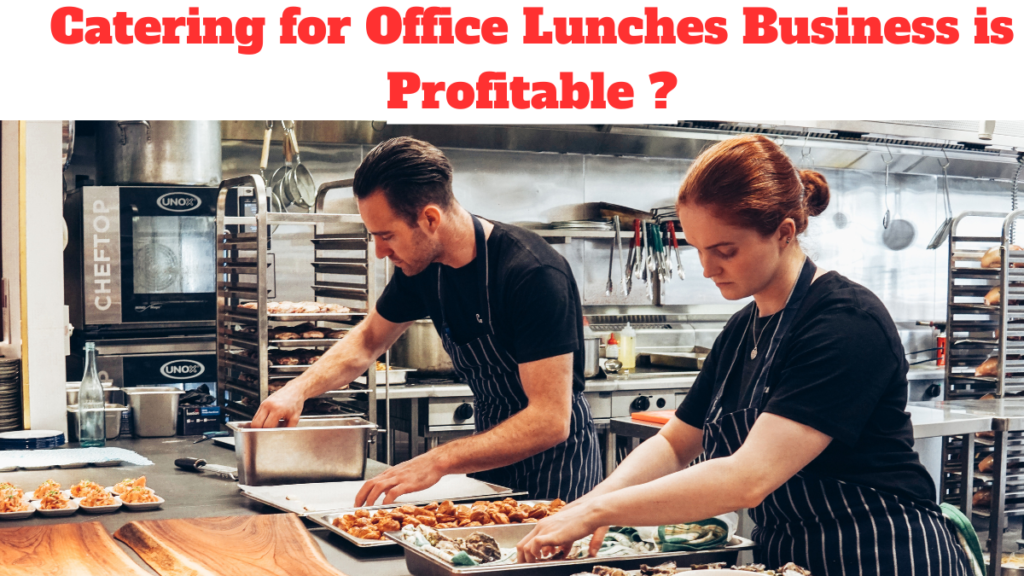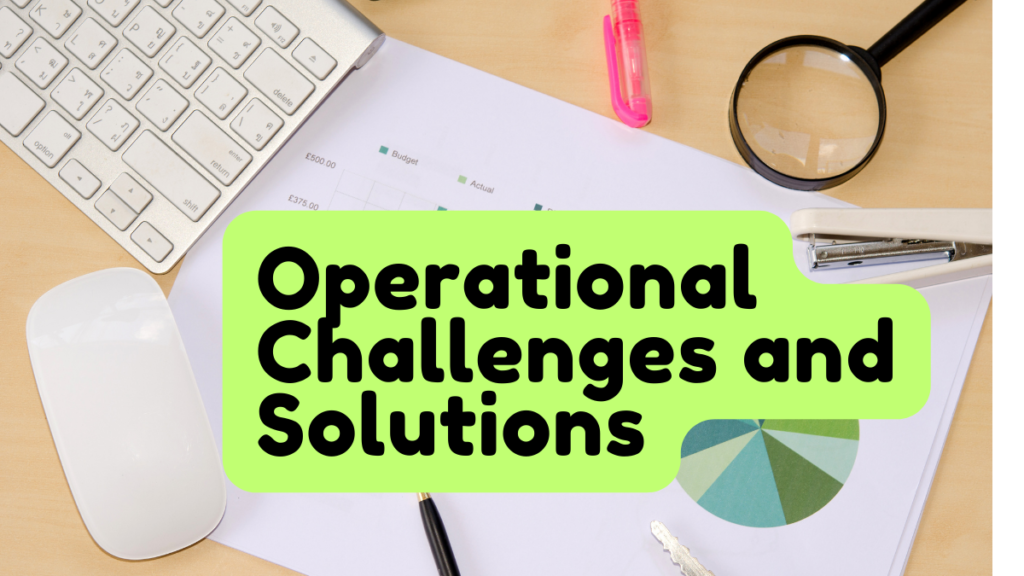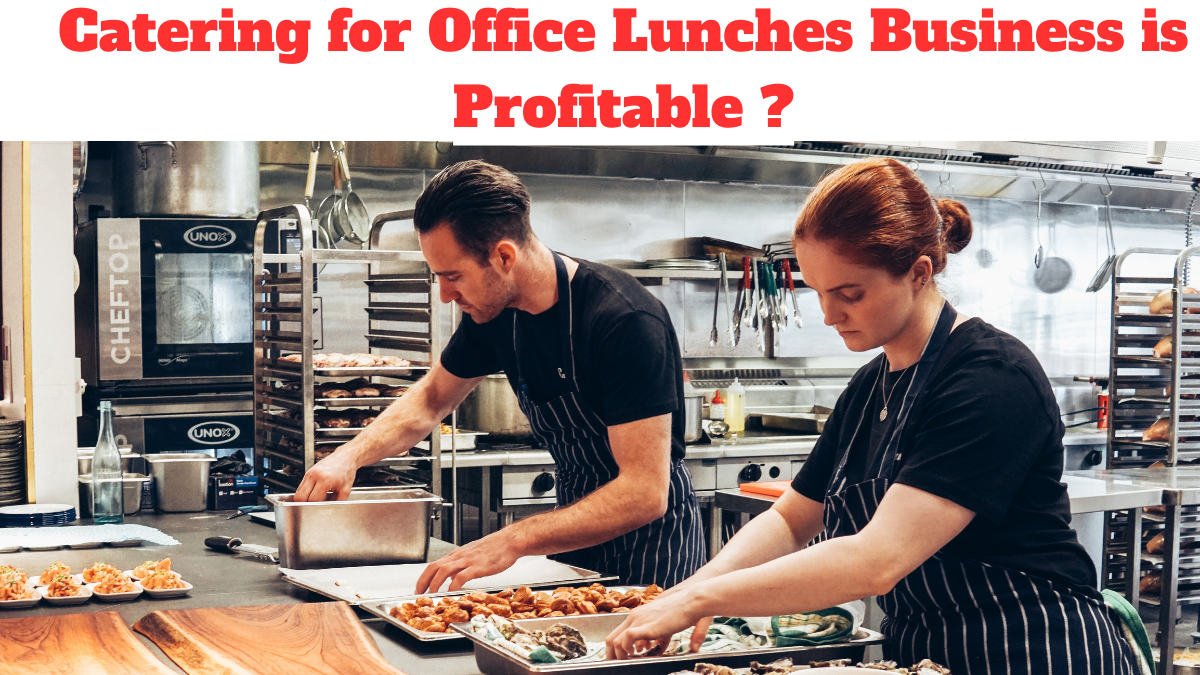Catering for Office Lunches Business
Catering for Office Lunches Business is Profitable ? Catering for Office Lunches Business is Profitable ? In recent years, the office catering business has emerged as a pivotal force within the broader hospitality industry, reshaping the way corporate clients approach dining solutions. This sector has undergone significant transformation, transitioning from a mere service provider to an integral player in meeting the dynamic culinary needs of modern workplaces.
Evolution in Hospitality Landscape:
The traditional concept of workplace dining has transcended basic cafeteria offerings to a more sophisticated and tailored approach. Office catering now goes beyond merely providing sustenance; it has evolved into an industry that emphasizes quality, convenience, and a diverse array of culinary options. This evolution is closely linked to the changing dynamics of work environments.

Shifting Workplace Dynamics:
As workplaces undergo substantial transformations, embracing concepts like remote work, flexible schedules, and collaborative spaces, the demand for innovative and efficient dining solutions has skyrocketed. Employees no longer perceive lunchtime as a routine break but as an opportunity to experience diverse and high-quality culinary offerings right within their workspaces.
Rising Demand for Diversity and Efficiency:
The demand for office lunch options has moved beyond the conventional, embracing diversity in cuisines, accommodating dietary preferences, and ensuring efficient delivery systems. Employers recognize the role of quality meals in enhancing employee satisfaction, productivity, and overall well-being. Consequently, the office catering business has positioned itself as a crucial partner in fostering positive workplace cultures.
Key Role in Corporate Wellness:
Office catering businesses are instrumental in promoting corporate wellness initiatives. They contribute to creating an environment where employees have access to nourishing and appealing meals, aligning with the growing emphasis on health-conscious choices in both personal and professional spheres.
Integration of Technology:
Technological advancements have played a pivotal role in the growth of office catering. Online platforms, mobile applications, and streamlined ordering processes have made it easier for businesses to access catering services, fostering a seamless and tech-savvy dining experience.
In essence, the background of the office catering business reflects its evolution from a conventional service to a dynamic and indispensable component of modern workplace culture. The trajectory is characterized by a commitment to providing not just meals but curated dining experiences that align with the diverse and evolving needs of today’s corporate landscape.
The Blueprint for Launching a Low-Investment ‘Catering for Office Lunches Business’
| Aspect | Details |
| Business Type | Catering for Office Lunches |
| Investment Estimate | Low |
| Staff Requirement | Initially, a small team including a chef, kitchen assistants, and delivery personnel. |
| Premises | Can start from a home kitchen or consider renting a small commercial kitchen space. |
| Materials | Basic kitchen equipment, utensils, and initial stock of ingredients for sample offerings. |
| Expenses | – Ingredient procurement – Equipment purchase or rental – Marketing and promotion |
| Profit Outlook | Profitability may grow gradually as the client base expands. Considerable potential with efficient operations and client retention. |
Please note that the values provided are general estimates, and actual figures may vary based on location, market conditions, and specific business strategies. It’s recommended to conduct a detailed feasibility study and business plan for more accurate projections.
10 Strategic Tricks to Elevate Your ‘Catering for Office Lunches Business
| Trick Number | Strategic Approach |
| 1. | Client Loyalty Programs: Introduce rewards for repeat orders, encouraging ongoing relationships. |
| 2. | Diversified Menu Offerings: Regularly update and diversify the menu to cater to varying tastes and preferences. |
| 3. | Promotional Packages: Create special packages or discounts for bulk orders or recurring contracts. |
| 4. | Online Presence: Establish a user-friendly website for online orders and leverage social media for marketing. |
| 5. | Networking: Engage in networking events within the local business community to expand your client base. |
| 6. | Feedback Implementation: Actively seek and implement feedback for continuous improvement and client satisfaction. |
| 7. | Seasonal Specials: Introduce seasonal menus or promotions to capitalize on specific times of the year. |
| 8. | Collaborations: Partner with local businesses or event organizers for catering opportunities. |
| 9. | Employee Wellness Programs: Offer specialized menus or discounts to companies promoting employee wellness. |
| 10. | Community Involvement: Participate in local events or sponsorships to enhance brand visibility and community connection. |
These tricks aim to enhance visibility, build relationships, and cater to the evolving needs of clients, ultimately contributing to the growth of the catering business.
The potential profit from a “Catering for Office Lunches Business” can vary widely based on several factors, including location, market demand, operational efficiency, and business scale. Here are some key considerations that can influence profit:
- Market Demand: Operating in an area with a high demand for catering services, particularly for corporate events and office lunches, can contribute to increased profitability.
- Operational Efficiency: Streamlining operations, optimizing the supply chain, and minimizing wastage can positively impact profit margins.
- Client Base: Building and retaining a loyal client base, including recurring orders from corporate clients, can contribute to a steady revenue stream.
- Pricing Strategy: Effective pricing that balances competitiveness with profitability is crucial. Offering various packages and incentives for bulk orders can influence overall earnings.
- Cost Management: Controlling costs related to ingredients, labor, and overhead expenses is essential for maximizing profits.
- Innovation and Differentiation: Introducing unique offerings, diversifying services, and staying ahead of culinary trends can attract more clients, contributing to increased profits.
It’s advisable to conduct a thorough market analysis, create a detailed business plan, and continuously monitor and adapt to market dynamics to optimize profitability. The profit potential is subjective and can significantly vary based on how well the business aligns with market demands and effectively manages its operations.
Market Analysis

Surging Demand for Office Catering Services
The escalating need for seamless office dining solutions in the midst of hectic work schedules has given rise to a thriving market for office catering services. The contemporary corporate landscape, characterized by time constraints and a focus on efficiency, has fueled the demand for hassle-free and high-quality dining experiences within office premises.
Evolving Trends in Workplace Dining
A comprehensive analysis of present trends in workplace dining unveils the nuanced preferences of today’s corporate clientele. Caterers, armed with insights into these trends, can strategically tailor their offerings to align with the culinary expectations and dietary inclinations of modern professionals. This adaptability positions office catering services as responsive to the ever-changing tastes and demands of the workforce.
Exploring Market Potential and Growth
Delving into the market potential and growth prospects offers valuable insights for entrepreneurs venturing into the office catering sector. As workplaces undergo transformative changes and prioritize employee satisfaction, the market for office catering presents substantial opportunities for growth. Understanding the dynamics of this evolving market is crucial for identifying lucrative niches and establishing a successful presence in the industry.
Legal Considerations
Business Registration and Licensing
In the realm of legal considerations, the importance of business registration and licensing cannot be overstated. Navigating the intricate legal landscape is imperative to ensure compliance with regulations that govern the food service industry. Entrepreneurs in the office catering business must undertake the necessary steps to register their enterprise and obtain the requisite licenses. This not only establishes the legitimacy of the business but also lays the foundation for a seamless and legally sound operation.
Compliance with Health and Safety Regulations
The adherence to health and safety regulations stands as a cornerstone of ethical and responsible business practices in the office catering sector. Maintaining stringent compliance not only upholds the well-being of customers but also plays a pivotal role in shaping the reputation of the catering service. Offices entrust their catering partners with the responsibility of providing safe and hygienic meals, making compliance with health and safety regulations not just a legal obligation but a fundamental commitment to professionalism.
Food Handling and Hygiene Standards
Beyond being a legal requirement, the maintenance of high standards in food handling and hygiene is a non-negotiable aspect of running a reputable office catering service. Building trust with clients hinges on the assurance that every aspect of food preparation, storage, and handling adheres to rigorous hygiene standards. Establishing and upholding these standards not only ensures legal compliance but also instills confidence in clients, contributing to the long-term success and sustainability of the catering business.
Operational Framework

Strategic Menu Planning and Diversification
In the operational framework of office catering, strategic menu planning and diversification emerge as pivotal elements. Tailoring menus to meet the diverse preferences and dietary requirements of office clients is not merely a culinary consideration but a strategic move. Careful planning allows caterers to offer a range of options that cater to different tastes, dietary restrictions, and cultural preferences within the workplace, contributing significantly to customer satisfaction.
Efficient Supply Chain Management
At the core of successful office catering operations lies efficient supply chain management. The sourcing of quality ingredients, ensuring their freshness, and minimizing operational disruptions are intricately tied to a well-organized supply chain. From procurement to delivery, a streamlined supply chain is essential for maintaining the quality and reliability of the catering service. This includes establishing strong relationships with suppliers, implementing inventory management systems, and ensuring timely deliveries.
Implementation of Robust Quality Control and Assurance
Guaranteeing the consistency and excellence of catering services hinges on the implementation of robust quality control measures. From the kitchen to the final presentation, every aspect of the catering process undergoes scrutiny to meet predefined quality standards. This includes regular inspections, adherence to standardized recipes, and attention to detail in presentation. Quality control not only ensures customer satisfaction but also upholds the reputation of the catering service, fostering trust and loyalty among clients.
Financial Viability
Understanding Various Revenue Streams in Office Catering
The financial viability of an office catering business relies on a nuanced understanding of diverse revenue streams. This includes exploring subscription models, one-time orders, and the integration of add-on services. Each revenue stream contributes uniquely to the overall financial sustainability of the business. By offering a variety of options, catering businesses can cater to the varying needs of their corporate clients, ensuring a steady and diversified income.
Comprehensive Cost Analysis and Profit Margins
Conducting a comprehensive cost analysis stands as a foundational step in ensuring the financial health of an office catering business. This involves a meticulous examination of all operational costs, from ingredient procurement to delivery logistics. Understanding these costs enables entrepreneurs to determine profit margins accurately. Armed with this information, catering businesses can then optimize pricing strategies to strike a balance between competitiveness and profitability.
Developing Effective Pricing Strategies for Competitive Advantage
The development of effective pricing strategies is a key aspect of maintaining a competitive edge without compromising profitability. Catering businesses must align their pricing with the value they provide, taking into consideration the quality of ingredients, the level of service, and the unique offerings in their menus. Strategic pricing not only positions the business competitively in the market but also ensures that the revenue generated is commensurate with the value delivered, fostering long-term sustainability.
Technology Integration

Enhancing Customer Convenience with Online Ordering Systems
Incorporating user-friendly online ordering systems is a pivotal aspect of technology integration in office catering. This strategic move not only enhances customer convenience but also streamlines the entire ordering process. The adoption of intuitive online platforms provides clients with a seamless experience, allowing them to browse menus, place orders, and customize preferences effortlessly. This not only aligns with modern consumer expectations but also positions the catering service as tech-savvy and responsive to evolving market trends.
Streamlining Delivery Logistics and Tracking for Timely Service
Efficient delivery logistics, complemented by real-time tracking systems, form a dynamic duo that significantly contributes to the overall success of office catering services. Streamlining the delivery process ensures timely and reliable service, a crucial factor in meeting the demands of busy corporate schedules. Real-time tracking systems not only provide transparency to clients but also empower the catering business to manage deliveries with precision, enhancing customer satisfaction and establishing trust.
Fostering Long-Term Relationships with CRM Tools
Utilizing Customer Relationship Management (CRM) tools represents a strategic investment in fostering long-term relationships and cultivating repeat business. These tools enable personalized interactions with clients, allowing catering businesses to understand preferences, track orders, and tailor services accordingly. The insights gained through CRM facilitate targeted marketing efforts, loyalty programs, and proactive communication, all of which contribute to building enduring relationships with clients. In the competitive landscape of office catering, a robust CRM strategy becomes a key differentiator for sustained success.
Marketing and Branding
Vitality of Building a Strong Brand Identity
In the competitive landscape of office catering, establishing a strong brand identity is not merely a choice but a necessity. A robust brand identity serves as the face of the catering business, encapsulating its values, mission, and unique offerings. Crafting a distinct brand identity is vital for standing out amidst competitors and creating a lasting impression on corporate clients. A strong brand identity fosters recognition, trust, and preference, essential elements in securing and retaining a loyal clientele.
Strategic Implementation of Effective Marketing Strategies
The implementation of effective marketing strategies is a dynamic driver for the growth and visibility of office catering services. Embracing digital marketing avenues, such as social media platforms and online advertising, allows businesses to reach potential clients in a targeted manner. Additionally, strategic networking, both online and offline, amplifies the outreach efforts. Leveraging these marketing strategies not only enhances visibility but also plays a crucial role in expanding the customer base and creating a positive brand perception.
Building Loyalty through Customer Retention and Referral Programs
The foundation of a successful office catering business rests on customer loyalty. Implementing customer retention programs, such as loyalty points or exclusive offers, establishes a connection beyond individual transactions. Furthermore, introducing referral incentives encourages satisfied clients to become advocates, contributing to organic growth. Building a loyal customer base through retention and referrals not only ensures repeat business but also solidifies the reputation of the catering service as a trusted and preferred partner in the corporate sphere.
Operational Challenges and Solutions

Proactive Approach to Address Dietary Restrictions and Preferences
Navigating the diverse landscape of dietary restrictions and preferences necessitates a proactive approach in the operational framework of office catering. This involves not only meticulous menu planning but also transparent communication with clients. Catering businesses must stay abreast of dietary trends, allergies, and cultural preferences to ensure that the menu caters to a wide array of needs. Clear communication channels with clients are paramount, enabling them to express their requirements, and fostering trust that their dietary concerns will be addressed with diligence.
Critical Role of Efficient Delivery Management
Timely and efficient delivery management stands as a critical component in the operational success of office catering. Meeting tight schedules, especially in corporate environments, requires meticulous planning and execution. Implementing solutions such as route optimization through advanced logistics systems enhances overall service efficiency. This not only ensures that meals are delivered promptly but also contributes to the overall positive experience of clients, a crucial factor in maintaining long-term relationships.
Strategies for Managing Seasonal Fluctuations
Seasonal fluctuations in demand pose operational challenges that require strategic solutions. Adopting strategies such as offering seasonal menus and diversifying services becomes instrumental in ensuring consistent revenue throughout the year. By anticipating and planning for variations in demand, catering businesses can optimize their resources, adjust staffing levels, and introduce seasonal offerings that resonate with clients. This adaptability not only helps navigate lean periods but also positions the catering service as responsive to the evolving needs of its clientele.
Customer Satisfaction and Feedback
Valuing Customer Feedback as a Tool for Improvement
Recognizing the paramount importance of customer feedback as a valuable tool for improvement and growth is foundational in the realm of office catering. Feedback serves as a direct line of communication from clients to the catering service, offering insights into their experiences and expectations. By valuing and actively seeking customer feedback, catering businesses can identify areas for enhancement, refine their services, and stay attuned to the ever-evolving preferences of their clientele.
Strategic Implementation of Customer Satisfaction Strategies
Elevating customer satisfaction from a goal to a strategic imperative involves implementing thoughtful strategies. Personalized service, where the catering experience is tailored to individual preferences, contributes significantly to long-term success. Proactive issue resolution, where challenges are addressed swiftly and with a customer-centric approach, fosters a positive perception and reinforces the commitment to client satisfaction. By consistently implementing these strategies, office catering services can establish themselves as reliable and customer-focused partners in the corporate realm.
Professional Handling of Negative Feedback for Continuous Improvement
In the pursuit of excellence, handling negative feedback professionally is not just a necessity but a crucial step towards continuous improvement. Negative feedback presents an opportunity for learning and growth. By approaching criticism with humility, acknowledging any shortcomings, and articulating corrective actions, catering businesses can turn negative experiences into positive outcomes. This not only showcases a commitment to customer satisfaction but also contributes to maintaining a positive reputation in the face of challenges.
Future Trends and Innovations
Staying Ahead with Technological Advancements in Catering
Anticipating and embracing technological advancements in the catering industry positions businesses to stay ahead of the curve. The rapid evolution of technology, from smart kitchen equipment to innovative ordering platforms, offers opportunities for efficiency, enhanced customer experiences, and streamlined operations. By proactively incorporating these advancements, catering services can not only meet but exceed the expectations of modern clients, setting the stage for sustained success.
Adapting to Changing Workplace Dynamics
Understanding and adapting to changing workplace dynamics is a strategic imperative for catering services. The rise of remote work trends and flexible office arrangements directly impacts the demand for catering services. Adapting to these shifts involves tailoring offerings to cater to virtual events, accommodating varying team sizes, and providing solutions that align with the evolving needs of modern workplaces. By staying attuned to changing dynamics, catering businesses can ensure their services remain relevant and in high demand.
Capitalizing on Emerging Opportunities in the Market
Identifying emerging opportunities in the market is a key strategy for the diversification and sustained growth of catering businesses. Whether it’s catering to new dietary preferences, incorporating sustainable practices, or capitalizing on cultural shifts, businesses that are agile and responsive to market trends can diversify their offerings and capture emerging niches. By identifying and capitalizing on these opportunities, catering services position themselves as innovative and adaptable players in the dynamic landscape of the office catering market.
Navigating the Pros and Cons of Launching a ‘Catering for Office Lunches Business’: An In-depth Analysis for Entrepreneurs
| Pros | Cons |
| 1. Low Entry Barriers: Requires minimal investment and can start from a home kitchen. | 1. Competitive Market: High competition in the catering industry. |
| 2. Flexible Operations: Can adapt to varying office lunch demands and dietary preferences. | 2. Seasonal Fluctuations: Potential variations in demand based on seasons and business cycles. |
| 3. Repeat Business: Establishing long-term relationships with corporate clients can lead to consistent orders. | 3. Logistical Challenges: Ensuring timely deliveries and managing logistics efficiently. |
| 4. Diversification Opportunities: Can expand services to cater virtual meetings, events, and other occasions. | 4. Initial Marketing Efforts: Requires effective marketing to build initial client base. |
| 5. Adaptable Business Model: Can pivot based on emerging trends and market demands. | 5. Operational Challenges: Managing dietary restrictions and diverse menu preferences. |
| 6. Potential for Growth: As the client base grows, there is potential for increased profitability. | 6. Quality Control: Maintaining consistent quality across varying order sizes. |
| 7. Community Presence: Building a positive brand image within the local business community. | 7. Initial Staffing Challenges: Recruiting and training staff for efficient operations. |
Please note that the pros and cons can vary based on the specific circumstances, location, and market conditions. It’s essential to conduct a thorough analysis before starting a business.
Frequently Asked Questions (FAQs) for a “Catering for Office Lunches Business”

| Question Number | FAQ | Answer |
| 1. | What types of cuisines do you offer for office lunches? | We offer a diverse range of cuisines, including [list cuisines]. Our menu is designed to cater to varying tastes and dietary preferences. |
| 2. | How can I place an order for office catering services? | Placing an order is easy. You can visit our website and use our online order form, or you can contact our catering team directly via phone or email to discuss your requirements. |
| 3. | Do you accommodate dietary restrictions and preferences? | Yes, we understand the importance of dietary preferences and restrictions. Our chefs can customize menus to accommodate various dietary needs. |
| 4. | What is the typical lead time for placing an order? | We recommend placing orders at least [X days] in advance. However, we understand that last-minute requests arise, and we do our best to accommodate them based on availability. |
| 5. | Are there discounts for recurring or bulk orders? | Yes, we offer discounts for recurring orders and bulk orders. Contact our catering team to discuss your specific needs and to explore potential discounts based on your order volume. |
| 6. | Can you handle last-minute orders for meetings or events? | We strive to accommodate last-minute orders whenever possible. Please contact our catering team, and we will do our best to fulfill your requirements based on availability. |
| 7. | What safety measures do you have in place for food handling? | We prioritize food safety. Our team follows strict hygiene practices, and we adhere to local health regulations. Additionally, our packaging is designed to maintain food freshness during delivery. |
| 8. | Do you provide catering for virtual meetings or remote teams? | Yes, we offer catering solutions tailored for virtual meetings and remote teams. Our menu options can be delivered to individual locations, ensuring a seamless experience for remote collaboration. |
| 9. | Is there a minimum order requirement for catering services? | While we don’t have a strict minimum order requirement, it’s advisable to check with our catering team for specific details based on your event or meeting size. |
| 10. | How are the delivery charges calculated? | Delivery charges are typically based on factors such as distance, order size, and logistics. Our catering team can provide a detailed breakdown of delivery charges based on your specific order. |
| 11. | Can you customize menus based on specific themes or occasions? | Absolutely! We specialize in creating customized menus to suit specific themes, occasions, or corporate events. Contact our catering team to discuss your preferences and requirements. |
| 12. | What payment methods do you accept? | We accept various payment methods, including credit/debit cards, bank transfers, and corporate accounts. Our catering team will provide you with the necessary payment details upon confirmation. |
| 13. | How can I provide feedback on the catering services? | We welcome your feedback. You can provide feedback through our website, contact our catering team directly, or fill out our post-event survey. Your input helps us continually improve our services. |
| 14. | Do you offer tasting sessions for potential clients? | Yes, we offer tasting sessions for larger events or corporate contracts. Contact our catering team to schedule a tasting session and experience the quality of our offerings firsthand. |
| 15. | Can you accommodate specific cultural or religious dietary needs? | Absolutely, we are experienced in accommodating various cultural and religious dietary needs. Please inform our catering team of any specific requirements, and we’ll tailor our offerings accordingly. |
| 16. | What steps do you take to ensure food freshness and quality? | We prioritize quality and freshness. Our chefs use high-quality ingredients, and our delivery processes are designed to maintain the freshness of the food. We adhere to strict quality control measures throughout the preparation and delivery process. |
| 17. | Are there additional charges for setup or presentation? | Setup and presentation are integral parts of our service. Depending on the scale and requirements of your event, there may be nominal charges associated with setup and presentation. Our catering team can provide detailed information based on your needs. |
| 18. | Can I request a quote for a customized catering package? | Certainly! Contact our catering team to discuss your specific requirements, and we will provide you with a detailed quote for a customized catering package tailored to your event or office needs. |
| 19. | Do you offer sustainable or eco-friendly catering options? | Yes, we are committed to sustainability. We offer eco-friendly packaging options, and our team can work with you to incorporate sustainable practices into your catering services based on your preferences. |
| 20. | Can I schedule a consultation to discuss my catering needs? | Absolutely! Our catering team is available for consultations to understand your unique requirements and provide tailored solutions. Contact us to schedule a consultation at your convenience. |
Conclusion
In conclusion, venturing into the “Catering for Office Lunches Business” offers a dynamic opportunity for entrepreneurs to tap into the evolving corporate dining landscape. As highlighted throughout this comprehensive exploration, careful considerations of market trends, legal obligations, economic viability, and innovative strategies are crucial for success. The multifaceted nature of this business requires a strategic blend of culinary expertise, operational efficiency, and customer-centric approaches. The positive impact on local economies, coupled with the potential for technological innovations and sustainability practices, positions this business as not only profitable but also impactful. Success stories underscore the potential for growth, while challenges necessitate a proactive and adaptable mindset. By embracing the outlined strategies and staying attuned to emerging trends, aspiring caterers can carve a niche in this competitive domain, offering delectable and tailored dining experiences for the corporate world.
Disclaimer
The information provided in this document is for informational purposes only and does not constitute professional advice. Readers are encouraged to seek specific guidance from qualified professionals for their individual business circumstances.
